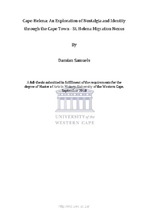Cape-Helena: An exploration of nostalgia and identity through the Cape Town - St. Helena migration nexus
Abstract
For
an
Island
measuring
merely
128
square
kilometers,
and
in
spite
of
its
remote
location
in
the
mid-South
Atlantic,
St.
Helena
“punches
way
above
its
weight
in
history”,
earning
and
occupying
a
privileged
place
in
British
scholarship
of
its
imperial
thalassocratic
age.
However,
prior
to
this
period
in
which
the
Island
was
indispensible
to
British
Empire
formation,
it
had
passed
through
the
hands
of
at
least
two
former
European
naval
nations
before
it
was
eventually
laid
claim
to
and
effectively
colonised
by
the
British.
The
Portuguese,
who
were
the
first
to
stumble
upon
the
uninhabited
Island
in
1502
-
naming
it
St.
Helena
in
honour
of
Roman
Emperor
Constantine
the
Great’s
mother
-
managed
to
keep
its
existence
a
closely
guarded
secret
for
over
eight
years.
For
nearly
a
century,
the
Island
was
reserved
for
exclusive
use
by
the
Portuguese
as
a
port
for
recuperation,
replenishing
and
re-provisioning,
which
they
usually
visited
on
their
homebound
journey
from
trading
(and
conquering)
in
the
East
Indies.
This
Portuguese
monopoly
of
use
of
the
Island,
however,
ended
during
the
last
decade
of
the
sixteenth
century
when
other
maritime
nations,
particularly
Dutch
and
later
English
traders,
became
aware
of
and
started
frequenting
the
Island.
The
initial
overlap
period,
constituting
the
first
three
decades
of
the
seventeenth
century
when
mostly
the
Dutch
and
Portuguese
shared
use
of
the
Island,
was
cause
for
occasional
hostile
encounters
between
the
two
nations.
Apparently,
continued
Dutch
and
English
harassment
of
Portuguese
(and
Spanish)
ships
made
visiting
the
Island
untenable
for
the
Portuguese
who
opted
to
avoid
St.
Helena
and
instead
make
use
of
a
number
of
their
other
port
‘possessions’
along
the
West
African
coastline
to
replenish
and
repair
their
ships.

